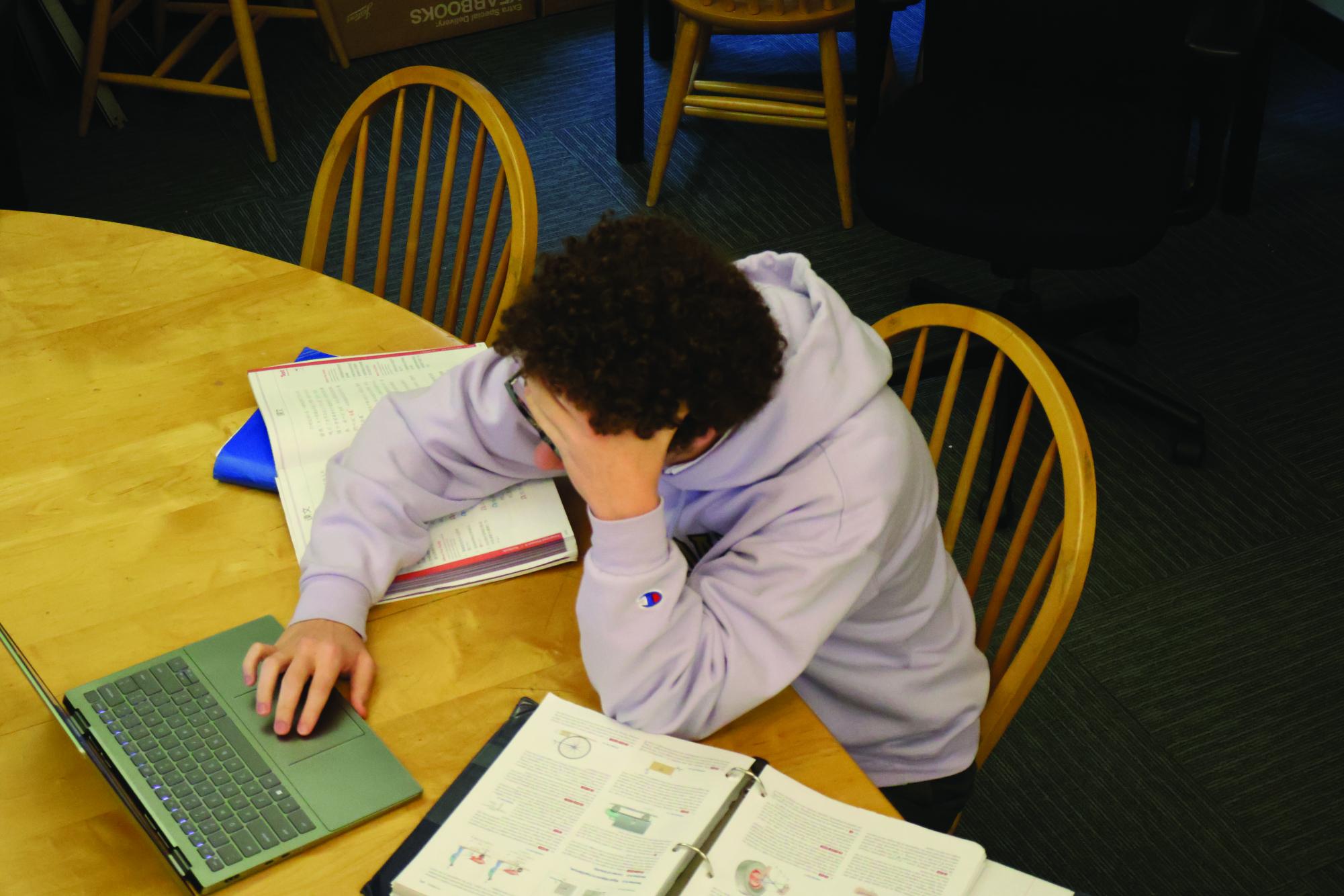The Wellness Center, located on the first floor of Centennial Hall, is built for Marksmen.
The Center is fitted with a student study room, filled with flashcards, markers and an expert on time management, Academic and Wellness Specialist Eliza Rosenbloom, seated just 5-feet away, creating a perfect environment for a successful studying.
Yet despite the fact that almost every student around campus could benefit from the Center’s resources, the study room often sits empty.
The reason why many students here fail to work ahead and manage their time effectively is often overlooked, and procrastination is considered a normal study tactic.
Some say it’s just what boys do.
The cause of this underdeveloped skill can first be seen in the brain.
A person’s time management and organizational skills, known as executive function, determine their productivity and efficiency navigating through situations in their daily life.
For boys, brain development can lag from 12 to 24 months behind girls, allowing girls to hone in on their executive function skills earlier than boys. This discrepancy often leaves boys lacking executive function through their teenage years until the brain fully develops around age 24.
“There are studies out there that show there are differences (among boys and girls) in neural networks or pathways in the brain, yet there is no evidence of structural differences,” Upper Scool Counselor Dr. Mary Bonsu said. “Their brains look the same structurally but they use different cognitive strategies to achieve executive tasks. Studies where teachers are asked to rate their students suggest that executive skill development happens at a different rate in boys than with girls.”
Executive function deficits such as ADHD, which is diagnosed far more often in boys, make it even harder for boys to stay on par or close to girls in terms of time management skills.
Specifically in school, when students’ executive function skills are truly put to the test, it’s common for boys to struggle with time management.
“The lack of organization game begets the procrastination game,” said Dr. Matthew Housson, psychologist and owner of The Housson Center, which provides psychological and educational services to families in DFW.
History instructor Michele Santosuosso has seen this phenomenon first-hand.
Before coming to the school, Santosuosso worked at Ursuline Academy in Dallas, an all-girls school, for nine years. When she taught there, students would take four classes a day, with each class lasting 90 minutes.
For Santo, implementing this type of schedule would be challenging here, given that boys, in general, have more trouble than girls getting through longer periods.
When the school schedule changed to include two 70 minute periods a day, Santosuosso realized she had to make changes in her teaching methods.
“I love the new schedule because it is hard to do a simulation or trial in 45 minutes,” Santosuosso said. “That summer going into the year that we had the new schedule, I had to really look at my flow, knowing not to expect young guys like freshman and sophomore to sit and listen to me yap for those longer periods.”
In order to keep her students attentive during 70 minute periods, Santosuosso splits the period into two sections, often dedicating one part to student-led discussions, documentaries or debates and one part to teaching.
In Santosuosso’s experience, as students mature into adults, they are better able to focus in their longer classes. However, she still believes that the issue of boys falling behind in school is a problem.
“When I was at Ursuline, it was, ‘How do we get more girls in STEM?’” Santosuosso said. “And we did it. Well, now it’s going the other way. If there are numbers that are showing that now it’s pivoting the other way, and numbers don’t lie, let’s even that out. We did it for girls. We need to do it for boys.”
Bonsu believes that part of the reason boys are falling behind is due to these underdeveloped executive functions. Combined with stress from the classroom, they can create a real problem for students.
“It really is a vicious cycle,” Bonsu said.
While these challenges can be daunting, there are several ways students can develop their executive function skills, starting with sleep.
The optimal amount of sleep for teenagers is roughly nine hours and 20 minutes.
“When you go under that number, you are compromising the amount of serotonin, the amount of dopamine, the amount of norepinephrine, all these really important brain chemicals that are related to attention, arousal and organization,” Housson said.
Getting sufficient sleep is vital to a student’s energy and focus the next day, improving executive function and overall efficiency.
“A lot of this is studying smarter,” Bonsu said. “Executive function is efficiency. It’s not about becoming smarter.”
Any way to improve efficiency helps a student come closer to their executive function potential.
“When we talk about executive function skills, they’re just like muscles,” Housson said. “You can go to the gym and work them out and build them at any time, but the earlier you start, the more incremental benefits you get over time.”
Housson knows a strong sleep and exercise routine can go a long way. But a student taking initiative to independently reach these markers takes it one step further.
“Junior year, the student needs to be as close to independent in their functioning as possible,” Housson said. “If you’re waking up your junior to get up (as a parent), you need to stop and let them figure out what it’s going to take to get him out of bed.”
Junior Deven Pietrzak has found his stride with managing his time.
As a member of the debate and math team, a baseball player and part time tutor, Pietrzak has a lot to balance with his schoolwork and academic pursuits, yet he’s developed a successful method of managing his time.
By utilizing free time and off periods while at school, Pietrzak is usually able to complete his daily homework before even going home.
“I’ll prioritize it based on urgency,” Pietrzak said.
Completing assignments ahead of time allows Pietrzak to focus more attention on his extracurricular activities after school hours.
But even with more time, Pietrzak occasionally faces situations where his commitments and schoolwork build up, putting him in stressful situations.
But by putting his head down and focusing on working, Pietrzak finds he can work efficientally.
“You have to do everything eventually,” Pietrzak said, “so even if it’s hard to start, I just do it.”
Yet thanks to his strong executive function skills, Pietrzak is usually able to avoid these kinds of situations. Pietrzak thinks setting ambitious goals in his various disciplines helps him be so effective with his time.
“It’s just a lot easier to put in work for something and to spend time on something when you’re really motivated to do it because you have those goals,” Pietrzak said.
In addition to good time management skills, Bonsu also knows motivation is an important executive function that can improve day-to-day efficiency.
And for those lacking executive function, it can be difficult to call attention to the fact that they are struggling and could use help.
“I think there’s an importance of looking in the mirror and saying, ‘hey, I’m struggling with this,’” Housson said. “And there’s going to be people around you who have different organizational skills who can be helpful. I would use the resources around you to the degree to which you can.”












